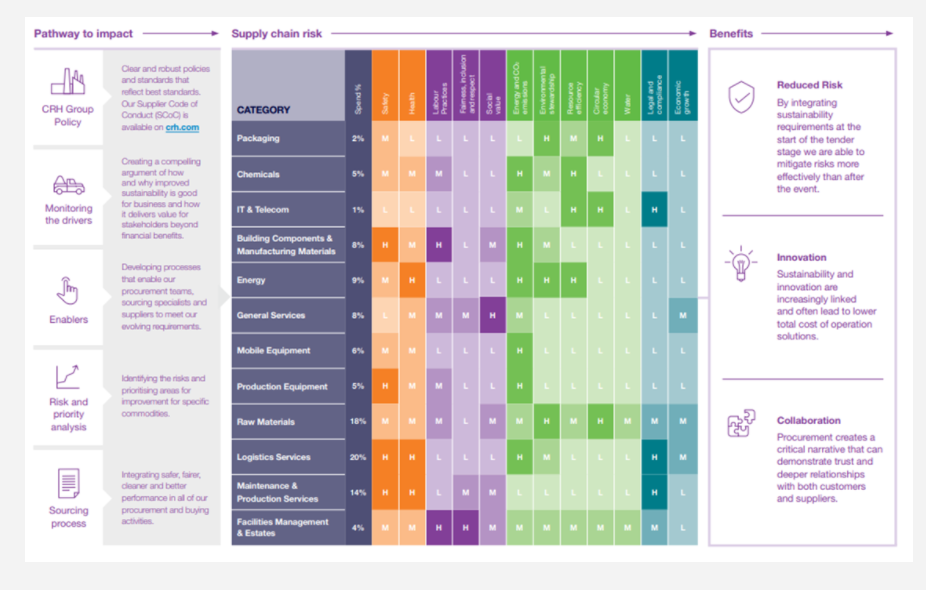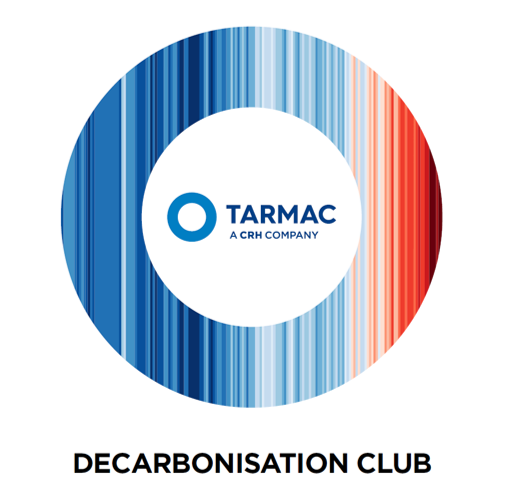Responsible Supply Chain
Objective
Responsibly procure all goods and services
Goals
All procured goods and services to be responsibly sourced
Collaborate with our supply chain to capture the innovation required to deliver net zero carbon
Engage our supply chain to support our wider sustainability objectives
“We look forward to a long and lasting relationship with suppliers where we can work together, sharing expertise and insight, to drive the innovation needed throughout the value chain that will help us to achieve our sustainability targets and reach net zero.”
Jonathan Harry, Procurement Director for Tarmac
Tarmac procures a significant amount of goods and services each year, so it is important to ensure they are sourced, manufactured and traded legally, ethically and with careful consideration of their environmental, social and economic impacts.
Highlights
Supply chain footprint
Our business is vertically integrated, which means we are able to extract and supply many of the constituent materials we use in our products and solutions ourselves – such as aggregates, sand, cement and lime. However, we also rely on other materials and services from a supply chain of over 6,000 suppliers. With such a diverse and complex supply chain, it is important that we understand the impacts of the materials we buy and take direct action to manage any potential risks associated with them.

Understanding risk and opportunities
Tarmac and CRH place business ethics and sustainability at the forefront of all business interactions, including with our suppliers. We expect our suppliers to share our commitment to ethical business practices and meet high standards in respect of human rights, health and safety and environmental stewardship.
Tarmac procures a significant amount of goods and services every year and to ensure that we fully understand and manage potential risks throughout our supply chain we align our procurement practices to ISO20400 Sustainable Procurement.
Our major contracts are awarded following a rigorous competitive tendering process and decision criteria include value, quality assurance and sustainability indicators. We assess supply chain risk against twelve sustainability aspects from a commodity ‘heat map’. By managing risks and opportunity in this way, we obtain a greater insight into our supply chain and can integrate improvements into commodity strategy plans and procurement decisions.
Sourcing and selling with integrity
At Tarmac, we want to give our customers confidence in the products we sell by ensuring that we are open and transparent in how our products have been sourced, manufactured and delivered to site. To do this we continue to ensure that Tarmac’s product range is certified against BES 6001 Framework Standard for the Responsible Sourcing of Construction Products and rated ‘EXCELLENT’.
The Responsible Sourcing certification is about demonstrating that we manage the environmental, social and economic impacts of our business throughout our supply chain in a responsible and ethical way. This is a major achievement for our business, and we are proud to have achieved this across our full product range. This gives our business and our customers confidence in the products we sell by ensuring all Tarmac's products are certified as responsibly sourced.
Setting the standard for ethical labour
Tarmac is verified to BES 6002 Ethical Labour Sourcing (ELS) standard, demonstrating our commitment to ethical sourcing practices and ensuring we are continuing to meet our customers’ expectations for responsible sourced construction materials.
To further support Tarmac’s commitment to people, Tarmac has partnered with a leading labour solutions supplier to manage our temporary labour force and supply chain. This will help Tarmac to ensure that its temporary labour workforce is protected and we remain compliant in areas such as:
- Modern Slavery & Human Trafficking
- Fair Working Conditions through the supply chain
- Agency Worker Regulations (AWR)
- Employee Right to Work
- Forthcoming IR35 legislation
This ensures Tarmac is providing equal pay, equal treatment and access to facilities for its temporary workforce whilst at the same time protecting them from the threat of modern slavery, people trafficking and forced labour practices.
The labour solutions supplier has also partnered with their chosen charities to focus on deprived communities by helping people to find employment and to upskill. This is achieved by providing soft skills training and specialist recruitment advice.
Aligning our supply chain with our values
We work closely with our supply chain partners to share our commitment to the environment, ensure good ethical practices and manage their environmental impacts to drive improvements. In 2021, our first Supplier Sustainability Week was attended by over 800 suppliers with the focus being on building collaboration, supporting suppliers to understand and improve their sustainability performance and identifying opportunities for suppliers to support Tarmac in achieving our net zero carbon and other sustainability goals.
During our Supplier Sustainability Week our Decarbonisation Club was launched with 16 of our key suppliers. The club was created as a way of working with our suppliers to identify the actions they can take to reduce their carbon emissions and our scope 3 emissions, as well as helping us to reduce carbon emissions from our operations and transport.
suppliers attended our first Supplier Sustainability Week

Supplier Innovation Challenge
In 2020-2021 we held our second Supplier Innovation Challenge to identify, understand and capture ideas that will be vital on our journey to net zero carbon. To identify as many good ideas as possible, we engaged across our entire supply chain but also included start-ups, scale-ups, SMEs and other organisations to ensure we left no stone unturned.
We had an amazing 174 ideas pitched to us, which were narrowed down to seven finalists and eventually one winner. These ideas were showcased at our Supplier Sustainability Week to provide inspiration and show our suppliers that Tarmac is open to new ideas and ready to act on them. Due to this success, we have also renewed our Supplier Innovation Challenge for 2021/2022 and are encouraging suppliers to think of new ways to further improve energy efficiency and transition to more renewable, low carbon fuels.
Sustainable packaging
Working with our supply chain partners, and as a result of our Supplier Innovation Challenge, Tarmac has become the first cement manufacturer in the UK to move to 50% recycled plastics in our packaging with our new fully recyclable hybrid bags. Our new packaging continues to be durable and provides essential protection against water damage. It also features clearer recycling information to help customers to responsibly dispose of the packaging after use. The roll out across all bagged cement products will result in millions of bags switching to the newer, more sustainable solution.
removes
Reducing what we use
As part of our drive to become a more environmentally sustainable business, we have implemented various strategies to reduce what we use across the business. This includes redesigning the wooden pallets used to transport some of our packed products. This action has resulted in an overall decrease in timber use of almost 600 tonnes. The key elements of the project that helped us achieve this were:
4-way to 2-way pallet redesign
- Reduced the weight of the pallet by 50%
- Led to a reduction in timber use of 207 tonnes
Tilbury pallet redesign
- Reduced the weight of the pallet by 38%
- Led to a reduction of timber use of 84 tonnes
Repatriated pallets
- Led to a reduction in timber use of 298 tonnes
Looking forward
Tarmac will continue to build on our successes throughout 2022. To ensure we can meet our sustainability ambitions, and help the suppliers in our supply chain to reduce their impact, we will continue to engage with our supply chain through our supplier sustainability events, including our Supplier Sustainability Week, Decarbonisation Club and Supplier Innovation Challenge to make significant improvements and reduce our footprint where we can.